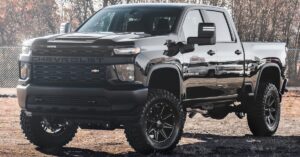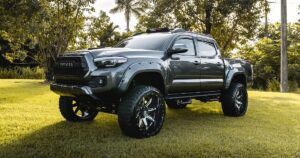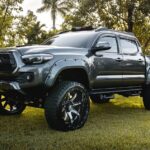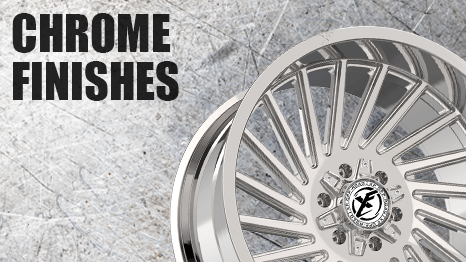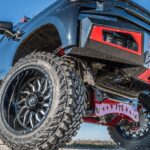Flow-Formed vs Cast Wheels: Best Pick for Off-Roading
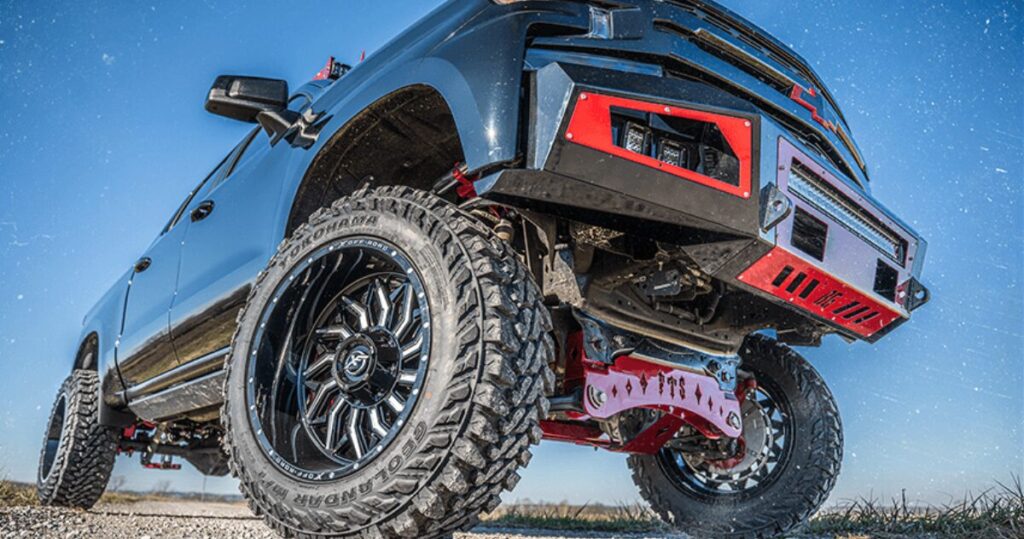
Flow-formed wheels are lighter, stronger, and durable. Perfect for off-roading. On the other hand, cast wheels are cheaper and versatile, the popular choice among daily drivers. Flow-formed wins on performance, cast wins on price. But the real decision depends on how and where you drive.
In the wheel industry, both flow-formed vs cast are known names. Cast wheels are made by pouring molten aluminium into a mold and then cooling it down. The trade-off is weight and durability. They’re heavier, and under heavy impacts, they can crack. Flow-formed wheels start out the same way, but then they go through an extra step: the wheel is heated, spun, and pressed with rollers. That makes the wheel denser, trims about 10–15% of the weight, and makes the wheel tougher.
If you’re after affordability and variety, cast wheels are solid. But if you want strength, performance, and extra confidence off-road, flow-formed wheels are worth it. At XF Off-Road, we build wheels that give you both style and toughness, so you can enjoy every drive with peace of mind.
Flow-Formed vs Cast Wheels: Quick Takeway
| What to Look At | Cast Wheels | Flow-Formed Wheels |
|---|---|---|
| How they’re made | Poured into a mold. Quick, simple, and keeps costs low. | Start as cast, but then spun and pressed to toughen up the metal. |
| Weight | Heavier, which can make your ride feel a little slower to react. | About 10–15% lighter, so your car feels quicker and more responsive. |
| Strength | Strong enough for normal roads, but can crack if you hit something hard. | Built tougher. More likely to bend instead of break, which is safer. |
| Durability | Great for daily driving, less ideal for rough trails or heavy abuse. | Handles bumps, potholes, and off-road conditions much better. |
| Style options | Tons of designs and finishes to match your look. | Fewer choices, since the focus is on performance. |
| Price | Easy on the wallet. The most affordable option. | Mid-range price. Costs more than cast. |
| Best for you | Everyday drivers who want style on a budget. | Drivers who want strength, lighter weight, and more confidence off-road. |
What are Cast Wheels?
Flow-formed wheels are basically cast wheels that go through a special upgrade process. Instead of stopping at the normal casting stage, the wheel is heated, spun at high speed, and shaped by rollers that stretch the barrel. This extra step changes the structure of the aluminum, making it stronger and lighter without the huge price tag of forged wheels. It’s like giving the wheel a workout so it comes out leaner and tougher.
For drivers like you, the payoff is pretty clear. Flow-formed wheels usually weigh 10–15% less than regular cast wheels, which means your car or truck feels quicker, handles better, and brakes more efficiently. Plus, they’re more durable and hold up better against potholes or rough terrain. Whether you’re daily driving, hitting back roads, or even heading off-road, flow-formed wheels give you a nice balance of performance, strength, and value.
Flow-Formed VS. Cast Wheels: Key Differences
When you’re shopping for new wheels, you’ll probably run into the debate: flow-formed vs cast wheels. On the surface, they might look similar, but the way they’re made and how they perform makes a big difference. Let’s walk through it together.
How They’re Born: The Making of Each Wheel
Cast wheels are created by pouring molten aluminum into a mold and letting it harden. Quick, simple, and affordable. Flow-formed wheels start the same way but get an upgrade: they’re spun at high speed while rollers stretch and compact the barrel. The result? A stronger, lighter wheel without the hefty forged-wheel price tag.
The Weight Game: Heavy vs Light
Cast wheels are heavier because they use more material to stay strong. Flow-formed wheels usually shave off 10–15% of the weight, which can mean dropping 3–6 pounds per wheel. That makes your ride quicker off the line, more agile in corners, and even a touch more fuel-efficient.
Toughness Test: Who Handles the Hits Better?
Cast wheels do fine for everyday driving, but they’re more likely to crack if you hit a big pothole or take them off-road. Flow-formed wheels, thanks to their denser barrel, resist impacts better. They often bend before breaking, which can sometimes be repaired. A big plus if you drive hard.
Style Points: Flashy or Sporty?
If you want variety, cast wheels take the crown. You’ll find them in almost every design, finish, and size imaginable, from simple OEM styles to bold aftermarket looks. Flow-formed wheels lean toward clean, sporty, performance-driven designs. Less flash, more function.
Price Tag Showdown: Budget vs Value
Here’s where things really split. Cast wheels are the cheapest, usually $100–$200 per wheel. Flow-formed wheels cost more. Around $250–$400 per wheel, but you’re paying for extra strength, lighter weight, and longer-term value.
If you’re chasing affordability and want endless style options, cast wheels make sense. But if you care about performance, durability, and want a wheel that’s lighter and tougher without going full forged, flow-formed wheels are the sweet spot.
U.S. Wheel Safety Standards Explained
For wheel shopping in the U.S., the main rule you need to know is SAE J2530. Think of it as the official “stress test” for aftermarket wheels. To earn that label, a wheel has to survive three tough trials:
- Rolling fatigue test → proves the wheel can handle thousands of miles of spinning without issues.
- Cornering fatigue test → makes sure it won’t give out under heavy side loads when you’re turning hard.
- Impact test → checks how well the wheel holds up when you hit something nasty, like a pothole or curb.
If a wheel passes all that, it earns the SAE J2530 stamp, which is your sign that it’s road safe in the U.S.
There’s also the Federal Motor Vehicle Safety Standards (FMVSS), which apply to all vehicle parts. They don’t have a wheel-only rule, but they do require that anything sold for road use, wheels included. Must be safe.
So here’s the takeaway for you:
- Always check if aftermarket wheels are SAE J2530 compliant.
- Extra marks like JWL, VIA, or TÜV are nice to see, but they’re optional in the U.S.
- If there’s no clear marking or certification, that’s a red flag.
Off-Road Performance Considerations: Flow-Formed vs Cast
Rocky Trails
Rocks are tough on wheels. If you’re rolling on cast wheels, they’ll do fine on light trails, but hit a sharp rock hard enough and they can crack. Flow-formed wheels, on the other hand, are stronger. They usually bend instead of breaking. And honestly, a bent wheel is still way better than a cracked one when you’re miles from home.
Mud and Sand
In soft stuff like mud or sand, weight is everything. Cast wheels are heavier, which means your rig has to work harder and may sink in deeper. Flow-formed wheels save a few pounds at each corner, and that lighter weight makes it easier to stay on top of loose ground and keep momentum going.
Airing Down for Grip
If you like to air down your tires for more traction, this is where the design really shows. Cast wheels don’t usually have anything special to hold the tire bead in place, so at low PSI you risk the tire slipping off. A lot of flow-formed wheels built for off-road come with knurled bead seats, which basically grip the tire and keep it locked even when you’re running super low pressure.
Long Trips & Overlanding
When you’re loading up for days of off-road adventure, durability matters. Cast wheels are budget-friendly, but if one cracks far from help, that trip gets stressful real quick. Flow-formed wheels not only take more abuse, but their lighter weight puts less strain on your suspension and brakes, which is a bonus when you’re hauling gear for miles.
Common Myths About Flow-Formed and Cast Wheels
Myth: “Cast wheels aren’t safe.”
This one gets thrown around a lot, and it’s not true. Cast wheels are safe as long as they meet proper standards like SAE J2530. Car companies use them on millions of factory vehicles. The real difference is that they’re heavier and can crack under a hard hit, while flow-formed wheels handle abuse a little better.
Myth: “A few pounds of weight doesn’t make a difference.”
It absolutely does. Dropping even 3–5 pounds per wheel reduces what’s called rotational mass. That means your car accelerates quicker, brakes faster, and just feels more responsive overall. Flow-formed wheels usually save you about 10–15% in weight compared to cast.
Myth: “Flow-formed wheels are way too expensive.”
Not really. Forged wheels can cost thousands. Flow-formed wheels sit comfortably in the middle. Yes, pricier than cast, but still way more affordable than forged. For what you get in strength and performance, they’re a solid value.
Myth: “Cast wheels look better because flow-formed ones don’t have style options.”
That might’ve been true years back, but not anymore. Flow-formed wheels now come in tons of finishes and designs, from sporty street styles to aggressive off-road looks. You don’t have to give up style to get performance.
Which Wheel Type Is Right for You?
The right wheel depends on who you are as a driver. Let’s break it down so you can see where you fit.
Cast Wheels: Everyday Heroes
- Best for someone who commutes daily, wants good-looking wheels, and doesn’t want to overspend.
- Affordable, widely available, and safe for normal road use.
- Downsides: heavier and can crack under hard hits, like deep potholes.
Flow-Formed Wheels: Balanced Performers
- Perfect for someone who enjoys spirited weekend drives or light off-roading but still wants to keep costs reasonable.
- About 10–15% lighter than cast wheels, which makes the car feel sharper and more responsive.
- Stronger barrels hold up better on rough roads and trails.
- Costs more than cast wheels.
Final Verdict
Cast and flow-formed wheels both have their place, and it really depends on what you want out of your ride. Cast wheels are easy on the budget and come in plenty of styles, making them a solid pick for daily use. Flow-formed wheels step it up with less weight and more strength, which means better performance and extra confidence when the road (or trail) gets rough.
At XF Off-Road, we build wheels that aren’t just about looking good. They’re about getting you where you want to go, no matter the terrain. Whether you stick to the streets or head out exploring, we’ve got the right set to keep you rolling strong and in style.

